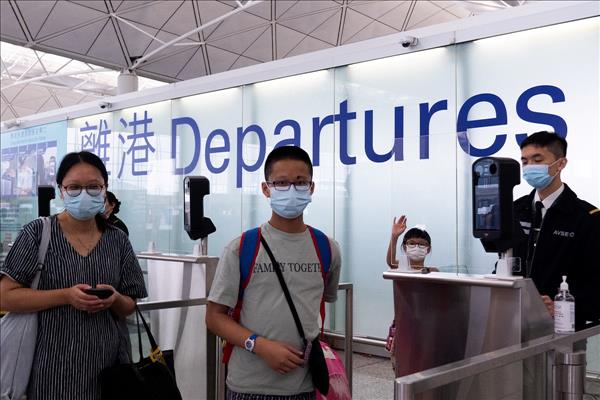(MENAFN- Asia Times) Confronted with an emigration wave and an aging population, Hong Kong has just registered the biggest decline in its working population in decades.
The workforce in the former British colony, which was handed over to Beijing in 1997, fell by 94,100, or 2.4%, to 3.87 million in 2022 from the previous year, according to the Census and Statistics Department. It is the largest drop since record-keeping started in 1985.
Between the beginning of 2019 and the end of 2022, the number of workers plummeted by 210,000, figures showed.
The city's Inland Revenue Department said on Monday that it sent out only 2.4 million tax bills for 2022/23, about 70,000 fewer than it sent for the previous financial year. It said that, over the three years, the number of people eligible for tax payment decreased by 370,000.
Academics said the exodus trend in the city has not yet ended as more people will move out within the next two years. They said that whether the Hong Kong workforce will continue to decline depends on the pace of the city's economic recovery after the pandemic.
Voluntary brain drain gets the most attention, but natural attrition is also a factor. Paul Yip Siu-fai, a professor at the Department of Social Work and Social Administration of the University of Hong Kong, told MingPao, a Hong Kong newspaper, that baby boomers (born during the postwar period, 1946-1964) have been retiring in the last several years, resulting in a decrease in the Hong Kong workforce.
Yip said he expects that the number of workers in Hong Kong will continue to decrease for one or two more years. Emigrants during that period will mainly be professionals and middle-class families, he said.

Hong Kong employers are facing difficulties in recruitment. Photo: Wikimedia Commons / Rodrigo Argenton
Simon Lee Siu-po, an associate professor in the Department of Management, at the Chinese University of Hong Kong, said that because the government has recently launched new measures to attract overseas and mainland talent the number of workers will stabilize next year or in 2025, assuming the local economy improves by that time.
Lee said the decline in the number of taxpayers will not have a big impact on the government's salary tax income – but the shrinking population will hurt consumption and housing demand as well as corporate profits and the government's overall tax revenue.
After the anti-extradition protests broke out in Hong Kong in June 2019, Beijing imposed the National Security Law in the city on June 30, 2020. Between 2020 and 2022, Hong Kong also implemented strict quarantine and social distance rules, which drove some foreign and Hong Kong talent out of the city.
About 144,500 Hong Kong people have moved to the United Kingdom through the British National Overseas (BNO) citizenship scheme during the two years that ended January 30, 2023, according to the UK Home Office. Some others moved to Taiwan, Singapore, Australia and Canada.
Chief Executive John Lee said Tuesday that the government has made attracting talent a key priority among all tasks as a labor shortage will affect services for the public and Hong Kong's competitiveness.
Lee said in his first policy address last October that Hong Kong had lost about 140,000 workers between 2021 and 2022. He avoided describing the phenomenon as an“emigration wave,” which would contradict Beijing's propaganda that Hong Kong has become prosperous again after the implementation of the National Security Law.
The government said its two-year visa plan for high-income workers and top university graduates has so far attracted 10,000 applications with most applicants coming from the mainland.
Last weekend, the Hong Kong Hospital Authority held a recruitment event in London to hire doctors. It said it was approached by 500 people. It said last year that mainland doctors will be allowed to practice in the city if the labor shortage continues.
Citing unnamed sources, HK01.com reported last week that the government is considering introducing mainland construction and logistics workers to the special administrative region. It said the city may also introduce mainland workers for the catering and tourism sectors if the proposed plan to recruit 7,000 elderly and disabled care workers this year runs smoothly.
Stanley Ng Chau-pei, a pro-Beijing lawmaker and the president of the Hong Kong Federation of Trade Unions, said the government should explain clearly why there is a need to hire non-local workers, instead of freely expanding its recruitment plans to different sectors.
Citing a recent survey, Lancy Chui, senior vice president at ManpowerGroup, a recruitment agency, said last Friday that 85% of 510 Hong Kong employers suffered from labor shortage problems.
Chui said companies will face more difficulties in hiring staff in the coming two years as labor demand is growing after the pandemic. She said professionals with information technology, engineering technology, sales and marketing and risk management skills are in strong demand.
She said she has seen a rising trend in which Hong Kong companies are hiring more overseas staff to work for them remotely.
read: china's demographic timebomb starts ticking down
Follow Jeff Pao on Twitter at
@jeffpao3
Like this:Like Loading...

























Comments
No comment